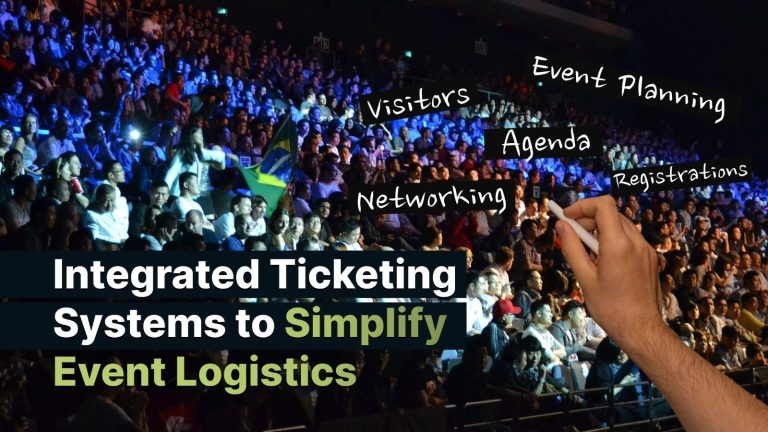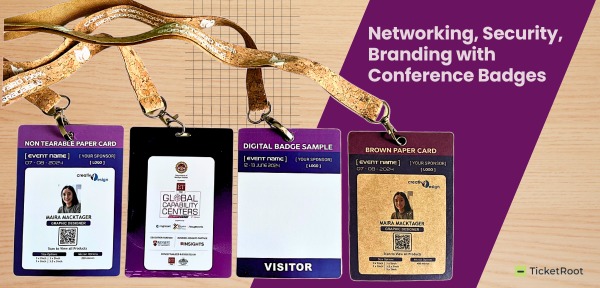Coordinated ticketing systems have brought about innovations in organizing and managing events, including pre-and post-ticketing event solutions. With the global market for online event ticketing projected to reach USD 82.23 billion in 2024, the importance of leveraging technology to enhance attendee experiences cannot be overstated. We should now look at how these systems help ease the management of your event, beginning with a key stage: the pre-event phase.
I. Pre-Event
Defining event goals and objectives.
Clarifying the Purpose: Begin this process by posing a question to yourself: What is the main objective of the particular event that you are planning? Do you need leads for a certain product, are you an online businessperson or a website owner seeking to advertise a particular product, are you in need of funds, or do you just need a means to entertain your audience? It will also assist in defining goals and objectives for your planning process and determining your degree of success as well.
Target Audience Analysis: Knowing the identity of the attendees is crucial. To ensure that attendees are satisfied with your event, make sure to research their demographics, interests, and behaviors. It will also be useful when making further modifications to the registration process in terms of devices.
Setting Measurable Outcomes: It is critical to set up qualitative and quantitative metrics that will help you determine the event’s success. These qualitative goals can be defined in terms of ticket sales, attendee satisfaction ratings, or social media activity – whatever it is, quantitative outcomes can then be used to evaluate and enhance an event.

Selecting the Right Integrated Ticketing System
Feature Checklist: Some basic criteria when considering a ticketing system include whether the system is easy to use, mobile-friendly, how payments are processed, and whether the system provides real-time, easily accessible reports. An ideal system should also include options for branding and communication.
| Also read: Choosing the Right Event Registration System
Vendor Comparison: Compare ticketing platforms by considering the available options and features offered, users’ feedback, and customer service. Perhaps it would be helpful to request demos that will give you an idea of each system’s functionality.
Budget Considerations: Even if the company wants to purchase the most elaborate system, one must strike a balance between the cost of the system and the features it should come equipped with. You should always remember that the most costly solution may not necessarily be the best for your company.
Customising the Registration Process
Personalization Options: Customise your registration process by providing ticket options such as a VVIP ticket, early bird ticket, tickets for a group, etc. With this approach, not only can attendee satisfaction be improved, but more tickets are likely to be sold in the process.
Data Collection: Determine the information you want to collect from your registrants. This might be as simple as a name, phone number, email address, session or workshop preferences, and special dietary needs. By gathering the right data, planning is made easier, and the attendees have a good experience.
Security Measures: Make sure that any ticketing system that you decide to go with is GDPR-compliant and has adequate security protocols. The privacy of attendee data should always be safeguarded to ensure that participants trust their information and data with the event organizers and to also prevent any legal ramifications.
Early Bird and Special Offer
Creating Ticket Tiers: Provide various ticket options depending on the level of service and engagement required by the attendee. Some of the options for discounts include VIP, early bird, and group discounts. These tiers can lead to the development of the impression of urgency and, as a result, promote early purchases.
Promotional Strategies: Offer great deals and coupons as part of your advertising or marketing plan to attract attention and obtain pre-orders. Share it on social media, through email, and collaborate with other institutions to create awareness.
Tracking Sales Performance: Closely follow the results of early bird specials to determine the degree of interest and adapt your promotional techniques appropriately. From this data, you will be able to understand your audience’s buying behavior, which can inform future specific selling events.
II. Event Day
It is equally important for the organizers as well as the participants to achieve positive results on the event day. Here are some key aspects to focus on:
Streamlined Check-In Process
Mobile Ticketing: Implementing QR Codes and Mob Apps. This is now the age where tickets are no longer physical pieces of paper. Today’s meetings and gatherings involve the use of quick response codes and mobile applications for fast check-ins. Thus, people just scan their codes at the entrance, saving time and avoiding ticket loss at the same time.
| Also read: QR Phenomena: Origin, Uses and Reasons for its Popularity
On-Site Registration: Handling Last-Minute Attendees. As would be expected, there are always attendees who plan to be a part of the team at the last minute. Efficient registration processes also mean they can easily get their badges and seamlessly enter the event without long waits.
Efficient Badge Printing: Speeding Up Entry
Some conferences set up printers so that attendees can print badges on the spot. This not only effectively speeds up entry but also guarantees that all people are identified and recorded.
Real-Time Data and Analytics
Monitoring Attendance: Real-Time Updates on Check-Ins
The information about people who have checked in allows organizers to know at what time they are being attended to. This information is vital when it comes to implementing any changes that may be needed at the various stages of the event.
Engagement Tracking: Interactions of Attendees
It provides insight into how attendees engage with different elements of the event, making it easier to evaluate the success of various activities and sessions during the event. Mobile app interaction and RFID badges, for instance, offer essential information.
Adaptive Management: Making Adjustments on the Fly
Suppose there are problems at the event; with real-time analysis, the organizers can notice them and correct them. This includes assigning more workers to areas where congestion is observed or changing shift patterns to guarantee that attendees do not encounter any inconveniences.
Enhancing Attendee Experience
Interactive Elements: Using Social Media and Live Polls
Interact with attendees through post-event social media feeds and by utilizing live polls within the event. Such elements not only keep the audience interested but also allow the organizers to receive immediate feedback.
Personalized Agendas: Flexible Timetables for Participants
Thus, inviting participants to shape the experience themselves is beneficial as it enables them to capture the most value from the event. Flexible schedules help them attend classes that will benefit them based on the areas of greatest interest or concern.
Help Desks and Support: On-Site Help in Case of Problems
Proper staffing of the help desks and support teams gives confidence that any problem or query that arises will be attended to immediately. Such support improves the quality of the attendee experience and assists in keeping a positive tone throughout the event.
III. Post-Event Analysis
It is important to get proper feedback that will reveal strengths and areas that require enhancement in terms of organizing an event successfully. Here are the key ways through which you can maximize the benefits of your integrated ticketing system for post-event analysis.
Comprehensive Data Analysis
Post-Event Surveys: Attendee Feedback
The first thing that needs to be done is to collect responses from the participants once the event is over. Having an integrated ticketing system means it is easy to conduct post-event surveys as well. Such surveys may contain important information regarding the level of satisfaction of attendees, their experiences during the particular event, and other related factors.
Performance Metrics: Measuring success based on KPIs.
Now you can assess your performance indicators using all the data that were collected during the event. Such measurement tools could include the number of tickets sold, attendance, participation, and other related factors. To measure the success of the event, benchmark the numbers against Key Performance Indicators (KPIs).
Vendor and Partner Feedback: Research from Participants
One often-overlooked source of feedback is your vendors and partners. They can offer some valuable information regarding the organization of the event. Was there any problem with how setup or coordination was done? In their view, how effective was the integrated ticketing system? This feedback can show what needs to be changed for future events.
Reporting and Insights
Detailed Reports: Making Key Findings Summaries
Prepare clear and well-structured written reports that will contain a synthesis of your qualitative data analysis. These reports should address the findings from the attendee feedback, key performance indicators, as well as feedback from vendors and partners. An integrated ticketing system usually comes with features that allow for reporting, which can make this process easier.
Stakeholder Presentations: Communicating Information to the Users
Create slides summarizing the major accomplishments and recommendations for further enhancement of the situation. To make the information more understandable, try to use more charts and graphs. To achieve this, there has to be transparency to show everyone the results and assist in the future planning of the event.
Lessons Learned: Find the Weaknesses
The last process in the post-event analysis refers to the identification of lessons learned. Think about the planning phase, implementation, and follow-up phases of the event. What went well? What could be improved? Make sure you record these so that you can use them for planning future events. It can be concluded that improvements need to be made constantly to optimize the overall event experience.
Conclusion
Integrated ticketing systems serve as effective means of enabling efficient event management, such an option is Ticketroot. These systems range from setting physical and objective event goals and the ability to design registration pages to handling real-time event data on event day to post-event analysis. In light of this, event coordinators can use the features of integrated ticketing systems to facilitate the delivery of successful events to create value for the various stakeholders and the attendees of the event in particular.







